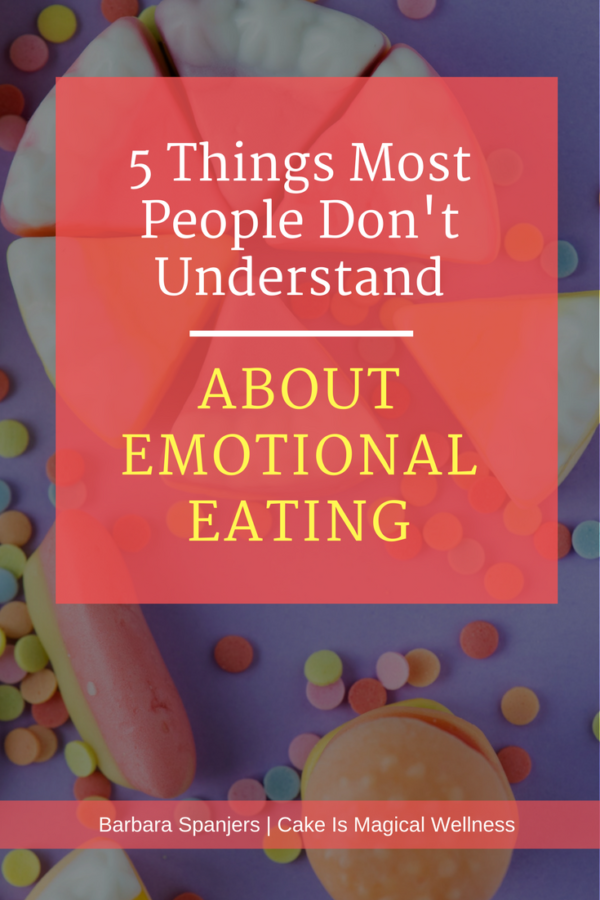One of the most common things I hear is “I’m an emotional eater!” And although I empathize with the experience of eating in a way that feels out of control, that isn’t necessarily emotional eating. And while it’s true that emotional eating can be troublesome, it usually not be the terrible habit it’s usually presented to be.
Here are five things most people don’t understand about emotional eating. It may put things in a new context.
1. The Urge to Eat Might Not Be Emotional After All
Although the drive to eat a pan of brownies at 10:00 pm feels intense, the cause might not be so clearcut. Yes, emotional eating can feel extreme. But so can eating because you’re overly hungry. And so can eating because you’ve deprived yourself of the foods you were in the mood for.
Did you eat enough during the day, or even during the previous week? If you are following a diet or eating plan that tells you what, when, and/or how much to eat, you may not be getting enough food. No one’s energy needs are the same every day; your body will clue you in to how much to eat. But you have to be willing to listen to it. Once you begin healing your relationship with food by tuning in to your body’s cues of hunger and fullness, and choosing foods that are satisfying, you may be surprised that your “emotional eating” diminishes.
Also check in with yourself to see if your eating is trying to meet other needs. Ask yourself if you are getting enough of the following:
- sleep
- sensual pleasure (could even be massages or cuddling with pets)
- expression of feelings
- intellectual and creative stimulation
- comfort and warmth
Pin This

2. Emotional Eating Isn’t Automatically Bad
You’ve probably heard the saying “Eat to live, don’t live to eat.” It’s well-intended, but actually misses the mark. We aren’t just like cars, who only need some fuel neutrally pumped in periodically.
When I was in elementary school, we spent time imagining future inventions. Jetpacks were one possibility. Another future development imagined by 9-year olds was that a pill could meet all nutritional needs. I’m still waiting for my jetpack, but will take a pass on the pill.
Why?
Because eating is meant to be pleasurable. Mealtime is an experience meant to be shared with friends and family. All cultures have eating customs, and special foods. Stripping the pleasure out of it would be a shame.
What feelings come up when you imagine an infant propped up alone with a bottle? Horror? Disgust? Is your first impulse to go cuddle the baby while she eats? If food were really just fuel, it would be fine to prop a baby with her bottle. As she grows, the connection of mealtime continues. According to the Family Dinner Project, family meals result in multiple benefits, including:
- Better academic performance
- Higher self-esteem
- Lower risk of substance abuse
- Lower risk of depression
- Lower likelihood of developing eating disorders
Food is social from the first day of our lives. Reducing meals down to their nutritional components (like might happen with an eating plan/diet) misses the bigger picture. And ironically, it sends us searching for comfort foods.
3. Emotional Eating May Not Really Work, Anyway
Whaaat?! “Everybody knows” that when we snarf down cookies we feel better. Right? Well, maybe not.
Psychologist Traci Mann found that participants’ moods tend to bounce back, regardless of whether anything is eaten or not. This concept is not unknown to therapists. If you eat to avoid feeling tough stuff, our work together includes helping you sit with and ride out negative feelings. What most people discover is that moods rise up, peak, and come back down – much like an ocean wave.
So the next time you have an emotional urge to eat your mom’s cheesy potato recipe, go ahead and enjoy them as is. No bad mood required.
[click_to_tweet tweet=”Food is social from the first day of our lives. Reducing meals down to their nutritional components misses the bigger picture.” quote=”Food is social from the first day of our lives. Reducing meals down to their nutritional components misses the bigger picture” theme=”style5″]
4. Emotional Eating Can Happen with Any Feeling
What do you think of when you hear the phrase “emotional eating?” Most often, it evokes the image of a sad, lonely, bored, or angry person eating away any negative emotions. Oh, who’s kidding about “person”? The stereotype involves a woman avoiding difficult confrontations. (Like Tina Fey demonstrates here.)
Food has powerful connotations. And don’t forget how intertwined taste and smell are. Our sense of smell is very old and primal. It is the sense most closely linked with memories. When we breathe in an odor, it’s first processed in an older area of our brain, closely tied to emotion and memory. Positive memories of celebratory foods can lead us to choose those same foods.
5. Emotional Eating Doesn’t Need to Be Controlled
What has happened in the past when you tried to control emotional eating? Was it successful?
Probably not.
Like so many things, trying to exert control often backfires. It’s like telling yourself to avoid thinking about the pink elephant in the room. Your inner teenager insists on sabotaging your best efforts.
So what to do?
Instead of fighting your urges to emotionally eat, or wrangling up all your willpower, lean in. What can you learn from listening to your urges instead of fighting them? Identify what’s going on. Is there an issue at work with your boss? Or with a family member?
Whatever feelings come up, let them be. Feelings may feel good or bad, but don’t need to be judged as good or bad. They just exist. And they can point you in the direction of solving the real issue.
Because no amount of Oreos will help you have that tough conversation with your mom.






